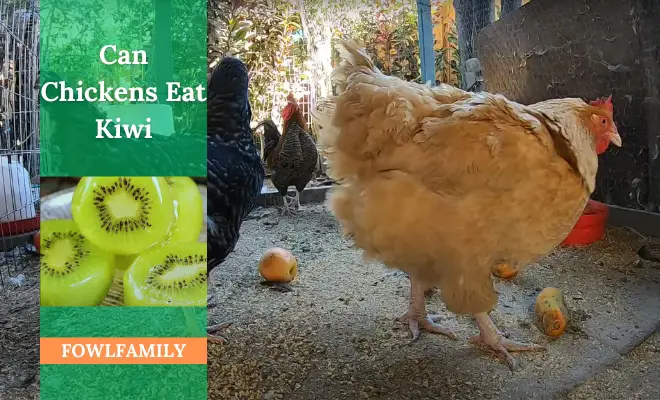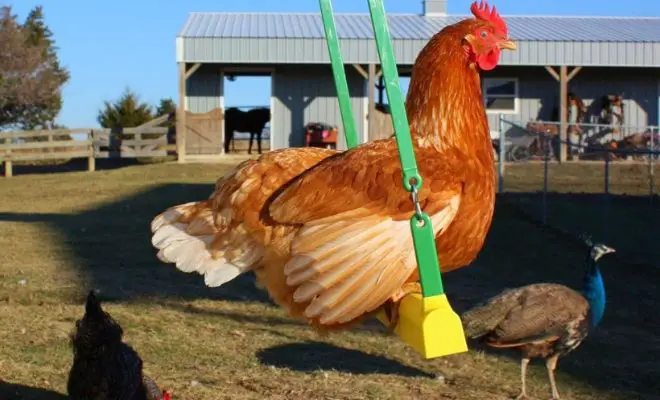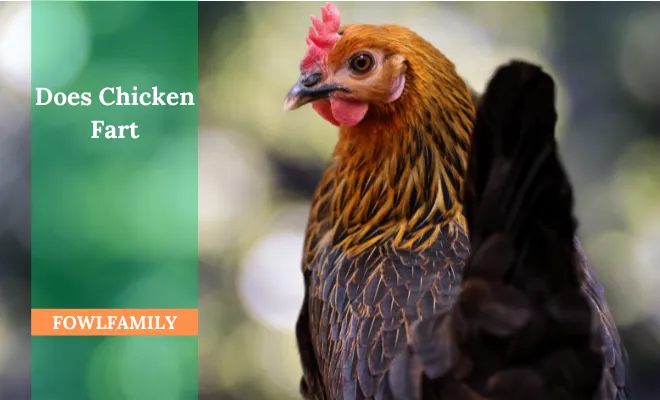Can Chickens Eat Kiwi? Yes, All Kiwi Parts Are Safe!

Who doesn’t prefer to offer a flavorful flesh of kiwi to their chicken? At least I would!
But can chickens eat kiwi? Yes, kiwis are a sure part of the diet with juicy flavor. You can feed any part of the kiwi, but make sure to offer a moderate amount as a nutritious treat. I would also suggest growing some kiwi in the garden for yourself and for the chicken mates.
Do you know Kiwi fruit is actually the Chinese gooseberry, which contributes most to the immune system? If you don’t know already, this article is for you. It’ll streamline the benefits and risks of overfeeding and provide tips for ideal supplementation here. So, stay tight!
Table of Contents
Can chickens Eat kiwi? Is Kiwi Safe for Chickens?

Yes, chickens are safe when they eat kiwi, as it’s a nutrient-dense treat. Chickens are naturally curious and omnivorous birds, so consuming kiwi won’t be any new idea.
According to Research, kiwi berries are for poultry and are quite beneficial. A study conducted by the University of California, Davis, found something great. They discovered supplementing chicken feed with kiwifruit extract improved their growth performance. Plus, it reduces the incidence of intestinal infections.
Check the video to see how chickens enjoy having kiwi in the ground.
Can Chicks Eat Kiwi? Safe!
Yes, chicks can eat kiwi! But it’s best to wait until chicks are at least 6-8 weeks old before introducing kiwis.
Their digestive systems are still developing and may not be able to handle the fruit’s acidity. Start with very small amounts of kiwi, no more than a few bites at a time.
7 Different Parts and Forms of Kiwi for Chickens

Kiwi fruits are a delicious and nutritious treat, but make sure you know about the different parts and forms of Kiwi fruit. Here’s a detailed breakdown:
1. Is Feeding Kiwi Seeds Safe?
Yes, kiwi seeds are safe for chickens to eat. They are a good source of vitamins, minerals, and healthy fats, contributing to overall health and well-being.
However, crushing the seeds first is recommended, especially for smaller chickens, to prevent choking hazards.
2. Can Chickens Have Kiwi Skin?
Absolutely! Kiwi skin is safe and even beneficial for chickens. It’s rich in antioxidants and fiber, aiding digestion and gut health.
However, some chickens might find it difficult to digest the skin’s toughness. To make it easier, you can chop the skin into small pieces or offer it shredded.
3. Do Chickens Eat Golden Kiwi?
Yes, chickens can eat golden kiwi with no problems. It offers the same nutritional benefits as the green variety but with a sweeter and milder taste. Some chickens may even prefer the golden kiwi’s softer texture.
4. Are Kiwi Peels Good for Chickens?
Yes, kiwi peels are safe and beneficial for chickens, just like the skin. They are packed with nutrients and fiber, promoting gut health and digestion. Offer the peels chopped or shredded to make them easier to eat.
5. Can I Offer Kiwi Leaves to Chickens?
While not directly harmful, kiwi leaves are not recommended for chickens. They lack significant nutritional value and may cause digestive issues due to their tough texture. Focus on offering the fruit’s flesh, skin, and seeds for optimal nutrition.
6. Should I Offer Raw Kiwi or Cooked Kiwi?
Raw kiwi is the preferred option for chickens. Cooking can destroy some of the fruit’s nutrient content, making it less beneficial. Moreover, chickens are naturally inclined to eat raw fruits and vegetables.
7. Will Chickens Consume Frozen Kiwi?
Yes, chickens will eat frozen kiwi as long as it is fully thawed. Frozen kiwi can be a convenient option for long-term storage, but it may lose some of its nutrients during the freezing process.
Nutritional Table of Kiwi for Chickens
Here is the nutritional content of 100 grams of fresh kiwi fruit based on USDA data:
| Nutrient | Amount |
|---|---|
| Calories | 61 |
| Carbohydrates | 14.66 g |
| Sugar | 9.14 g |
| Fiber | 3 g |
| Fat | 0.5 g |
| Protein | 1.1 g |
| Vitamin C | 64 mg |
| Vitamin E | 1.14 mg |
| Vitamin K | 2.1 mcg |
| Potassium | 312 mg |
| Magnesium | 17 mg |
8 Health Benefits of Feeding Kiwi to Chickens
Feeding kiwi to chickens is like giving them a super-healthy treat! Here’s why I am praising this fruit!
1. Health Boost
Kiwi has a lot of vitamin C, which helps chickens stay strong and fight off sickness.
2. Promotes Feather Health
The vitamin E content in kiwi contributes to maintaining healthy feathers. Chickens with a diet that includes kiwi may exhibit shinier and more vibrant plumage, a sign of their well-being.
3. Aids Digestion
Kiwi is an excellent source of dietary fiber, which can aid in the digestion of chickens. Including kiwi in their diet may help prevent digestive issues and promote a healthy gut.
4. Provides Antioxidants
The antioxidants present in kiwi, such as flavonoids and carotenoids, can help combat oxidative stress in chickens. This, in turn, contributes to their overall health and longevity.
5. Supports Respiratory Health
The high vitamin K content in kiwi is beneficial for respiratory health in chickens. It may assist in maintaining healthy airways and minimizing the risk of respiratory issues.
6. Balances Electrolytes
Kiwi contains essential minerals like potassium, which plays a role in balancing electrolytes. This can be particularly beneficial for chickens during hot weather or periods of stress.
7. Strong Bones
Kiwi has calcium and phosphorus, making chicken bones strong. It’s like giving them the building blocks for a tough skeleton!
8. Quick Energy
Kiwi has natural sugars that give chickens a quick energy boost. Perfect for when they’re playing a lot or feeling a bit tired.

4 Potential Risks of Feeding Kiwi to Chickens
While giving chickens kiwi can be a tasty treat, it’s essential to know about some possible risks:
- Upset Stomach: Too much kiwi might upset a chicken’s stomach. It’s like eating too many sweets – not good for anyone!
- Allergies: Some chickens might be allergic to kiwi. Watch out for any strange behavior or discomfort after eating it.
- Diarrhea: Feeding too many Kiwi can lead to diarrhea in chickens. It’s important to keep their diet balanced to avoid messy situations.
- Gut Blockage: The small seeds in kiwi can cause problems if chickens eat too many. It’s like swallowing something too big – not a good idea!
How to Feed Kiwi to chickens? A Proper Guideline!
Here is the time to show you how you should feed your chickens kiwi with the proper amount. Make sure you include such treats besides their balanced diet.
How Much Kiwi to Feed Chickens?
The general rule of thumb is 1 kiwi fruit per 6-7 chickens, maximum 3 times per week. But there are some facts that you must keep in mind:
- Smaller chickens require fewer kiwi than larger breeds.
- Adjust the amount of kiwi based on the rest of your chickens’ food intake.
- Chickens with access to free range and foraging opportunities can potentially handle slightly more kiwi.
However, here’s a general guide based on the number of chickens:
- For 2-3 chickens: 1/3 kiwi, 2-3 times per week.
- For -5 chickens: 1/2 kiwi, 2-3 times per week.
- For 6-7 chickens: 1 whole kiwi, 2-3 times per week.
How Often to Feed Kiwi to Chickens?
Here is the frequency you must follow while feeding kiwi to chickens –
- Limit kiwi consumption to 2-3 times per week.
- Offer kiwi alongside your chickens’ regular feed, not as a replacement.
- Rotate kiwi with other types of fruits and vegetables to provide a diverse diet.
- Avoid offering kiwi daily to prevent overfeeding and potential health problems.
Offering Kiwi: Feeding Steps and Serving Ideas for Chickens

Kiwis are a yummy and healthy treat for your chickens, but it’s essential to give them the right way. Follow these easy steps to make sure your chickens enjoy kiwis safely:
Feeding Steps:
Here are steps for offering kiwis to poultry chickens.
- Wash It: Clean the kiwi under water to get rid of any dirt.
- Cut It Right: Make small pieces so it’s not too big for your chickens, especially the little ones.
- Skin Check: If your chickens don’t like the skin, you can take it off.
- Pick Ripe Ones: Choose kiwis that are ready to eat. Avoid the ones that are still getting ripe because they might upset chicken tummies.
6 Serving Ideas for Chickens
- On the Ground: Place kiwi pieces on the ground in their area.
- Scatter for Fun: Spread the pieces around to make it like a game for them.
- Hide and Seek: Put kiwi in their bedding or scratch boxes for extra fun.
- Mix with Their Food: Mix chopped kiwi with their regular food.
- Cool Treat: Freeze kiwi chunks for a cool treat on hot days.
- Special Drink: If a chicken is sick, blend kiwi with water or chicken broth for an easy-to-drink treat.
Whatever you do, make sure you offer them in moderation and monitor how they react to such diets. If they like it, increase the amount a little. But if not, avoid feeding it and go for some nutritious treat.
Growing Kiwi in Garden for My Chickens: How to Make it?
If you decide to grow kiwi for your chickens, here is what you should do –
- Choose hardy kiwifruit, self-pollinating and cold-hardy.
- Sunny location, well-drained soil, sturdy support structure. Plant in early spring or fall.
- Regular watering, fertilizing, annual pruning, pest and disease control.
- Late summer or early fall, when the fruit is soft to the touch.
- Offer kiwis in bite-sized pieces 2-3 times per week.
Recommended Readings:
Conclusion
So, can chickens eat kiwi? Yes, kiwis are a safe and nutritious treat for chickens. This is because it offers vitamins, minerals, antioxidants, and more.
However, moderation is key to avoiding digestive issues. By following the proper feeding guidelines, you can fasten the chicken’s growth. The proper guidelines include washing it properly, cutting the bite-sized kiwi, and offering it 2 to 3 times each week. And be sure to monitor whether your chickens like it or not.






